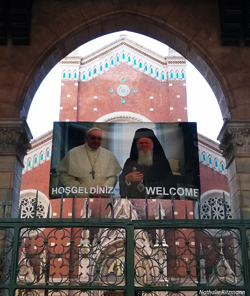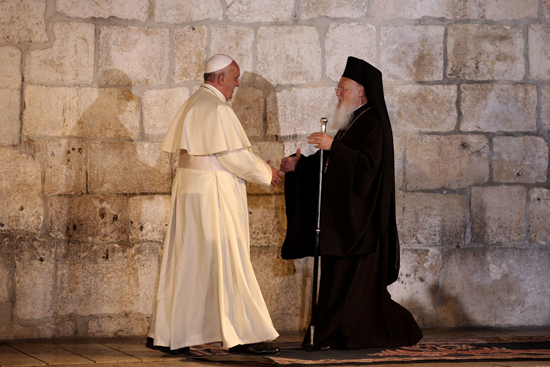When Francis lands in the Turkish capital Ankara on Friday he will embark on a visit around the historic geographical and cultural meeting point between East and the West.
He does so at the invitation of the Ecumenical Patriarch, Bartholomew, one leader of its embattled Christian minority, at a point when Muslim and Christian refugees from Iraq and Syria, fleeing Islamic State violence, flood its cities. Against a backdrop of religious persecution, violence and historic tension, and at the end of a hectic week that saw him address the European Parliament in Strasbourg, Francis has disparate priorities and just 72 hours to address them.
The Tablet will be in Turkey to cover the Papal visit: below are three of the key themes the Pope is expected to address.
Ecumenism
 Central to the Pope’s visit – and the impetus for it – will be his meeting with Ecumenical Patriarch Bartholomew, the spiritual leader of more than 300 million Orthodox Christians.
Central to the Pope’s visit – and the impetus for it – will be his meeting with Ecumenical Patriarch Bartholomew, the spiritual leader of more than 300 million Orthodox Christians.
Bartholomew is first among equals of Orthodox Patriarchs and the Archbishop of Constantinople-New Rome and 269th successor to St Andrew, brother of Peter.
Pope Francis and Bartholomew will mark St Andrew’s Day (30 November, Sunday) together with a service at the Patriarchal Church of St George, followed by the signing of a Common Declaration between the two Churches.
There is a modern precedent for popes commemorating the feast of the patron saint of the Ecumenical Patriarchate of Constantinople with its spiritual head. Francis follows in the footsteps of Popes Paul VI, John Paul II and Pope Benedict XVI.
But, arguably, Francis enjoys one of the strongest relationships with Bartholomew. They have met on a number of occasions: at the Vatican and, importantly, in Jerusalem in May, to commemorate the 50th anniversary of the meeting of Pope Paul VI and Patriarch Athenagoras. Through that historic meeting the mutual excommunications caused by the schism of 1054 were brought to an end.
 Crucially, Bartholomew attended the inauguration of Francis as Pope in 2013, the first time the head of the Orthodox Church has attended a papal ceremony in a millennium. Francis visits Turkey on his personal invitation. Both leaders have spoken of their hopes of an end to the centuries-long divide. “We’re united in blood, even if among ourselves we still haven’t succeeded in taking the necessary steps towards unity,” Francis said last year.
Crucially, Bartholomew attended the inauguration of Francis as Pope in 2013, the first time the head of the Orthodox Church has attended a papal ceremony in a millennium. Francis visits Turkey on his personal invitation. Both leaders have spoken of their hopes of an end to the centuries-long divide. “We’re united in blood, even if among ourselves we still haven’t succeeded in taking the necessary steps towards unity,” Francis said last year.
Unity – or steps toward it – will be a goal for this visit. In a statement this week Bartholomew called the Pope “our brother”. He said: “We are eagerly awaiting the visit of our brother, Pope Francis. It will be yet another significant step in our positive relations as sister Churches.”
Ecumenism: moments to watch:
Saturday, 29 November
- Bartolomew attends Mass at the Roman Catholic Church of the Holy Spirit in Istanbul
- Pope Francis and Bartholomew participate in a Doxology of peace and thanksgiving at the Patriarchal Cathedral of St George. The prayer service will be followed by a private meeting between the two Church leaders.
Sunday, 30 November
- Pope Francis will attend the Divine Liturgy at the Patriarchal Cathedral, where both prelates will deliver official addresses, exchange the kiss of peace and together bless the faithful. After the Divine Liturgy, a joint declaration will be signed and the Patriarch will host a luncheon for the Pope at the Patriarchate.
Religious Persecution
Francis visits Turkey at a desperate time for its shrinking Christian population, and there is no doubt Francis’ visit is intended to boost morale in the tiny community. Persecution of Christians in Turkey is widespread and – some fear – escalating. What almost eradicated its Christian population almost exactly 100 ago was the genocide of the Armenians and the ethnic cleansing of the Greeks of Istanbul in the 1960s. The proportion of Christians has plummeted from 20 per cent in 1915 to around 0.2 per cent now. The murders of an Italian missionary priest in 2006, three employees of a Bible publishing house in 2007 and a bishop – Luigi Padovese, on 6 June 2010, the Vicar Apostolic of Turkey – caused great shock.
According to Turkish writer Cengiz Aktar the country is the most homogenous in terms of Islam in the region – including Iran.
More recently, crippling Government restrictions – an attempt to Islamise Turkish politics and society, to strengthen the country’s national identity under new Prime Minister Recep Tayyip Erdogan – have led to the closure of churches and theological colleges, or their conversion into mosques.
"To be a Turk now means you have to be Muslim," Fr Iulian Pista, who serves at the Catholic basilica in Istanbul, told the BBC recently, recalling instances of vandalism and aggression.
A spokesman for Aid to the Church in Need, a charity that supports persecuted Christians, said he hoped the meeting would bring Catholic and Orthodox Christians together, and that this would bolster the Christian community.
“And in a country where there are still very serious concerns about religious liberty, with many groups including the Catholic Church unable to own property, we also hope that Pope Francis’s visit will further the process of granting full freedom for all faith groups,” he said.
Francis has been outspoken in the past about the persecution of Christians. It will be interesting to see if, during his meetings with the Prime Minister and the President of Religious Affairs, how outspoken he is regarding the concerns of Christians in Turkey. Bartholomew, for example, has long been calling on the Government to re open the world-famous Halki Orthodox theological school near Istanbul.
The Catholic community in Turkey is small (0.05 per cent of the population, around 35,000) and diverse, made up of Latin, Byzantine, Amenian and Chaldean Rite Catholics. A fragmented minority within a minority, Francis’ visit and his albeit brief encounter with them at Mass on Saturday will galvanise the community.
Politics: moments to watch
Friday, 28 November: Francis meets the President of the Republic, public authorities, the Prime Minister and the President of Religious Affairs.
Saturday, 29 November: Mass at the Catholic Cathedral of the Holy Spirit
Islamic State
During his visit Francis is expected to acknowledge Turkey’s crucial role in Middle East politics. The country borders both Iraq and Syria, and has taken in vast numbers of refugees fleeing Islamic State militants. Turkey is a member of an anti-IS coalition, but not an outspoken one, due in part to its historic opposition to Kurdish nationalism and the Assad regime.
Security has been a concern – Francis will not travel in his open-topped pope mobile, ostensibly because there are expected to be fewer people lining the streets in this Muslim-majority country – but the Vatican has repeatedly said it trusts the measures put in place by Turkish security services.
How much contact Francis will have with refugees and IS victims remains ambiguous. When the trip was first announced, he was expected to travel close to the eastern border with Iraq. This was quietly dropped, but Crux now reports that he hopes to make an excursion there if it is deemed safe. No formal meeting with refugees is scheduled, but Vatican Spokesman Fr Federico Lombardi said that some might be present when the pope meets students from Catholic schools on Sunday. In Istanbul, he will be staying close to a Salesian school for Iraqi refugees.
Francis will no doubt tread carefully, but any support he voices for the Christian-run services supporting the flood of refugees will be welcomed. One priest who works with refugee children in Istanbul told me: “The flow of refugees from Iraq and Syria into Istanbul seems to have no end.”


 Loading ...
Loading ...